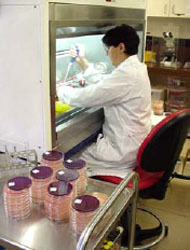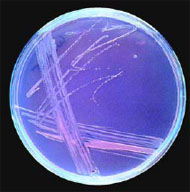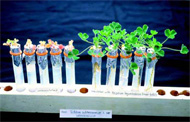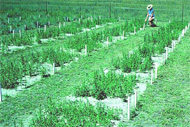
What does AIRG do?

Inoculant quality is determined by the effectiveness of the strain of rhizobia to ‘fix' nitrogen and the number of live rhizobia. AIRG currently assesses selected submitted batches produced by Australian and overseas manufacturers for both of these criteria. Each year, several hundred batches of peat inoculants are tested.
Under the Code of Practice and use of the ‘green tick logo’ each batch of inoculant is assessed to ensure that inoculants released for sale have:
- the approved and correct strain of rhizobia for the legume to be planted
- guaranteed high numbers of live rhizobia. The standard for all inoculants is 1,000 million/gram of fresh peat (except Lotononis)
- nil or minimal numbers of other non-rhizobia micro-organisms
- optimum moisture potential for growth and survival of the rhizobia after manufacture and during storage
- the strain’s capacity for nitrogen fixation with its legume test plant.
Only when these standards have been met, is the batch approved by AIRG for sale, with an expiry date.
‘Green tick’ logo inoculants have labelling standards that require information indicating:
- the legume/s for which the inoculant should be used
- application methods
- storage conditions
- expiry date / shelf life
- guaranteed number of rhizobia at point of sale
- batch number
Each year, AIRG supplies a fresh set of recommended inoculant strains for temperate and tropical legumes to the inoculant manufacturers. They then produce commercial inoculants from these cultures. These strains must meet stringent criteria before being released by AIRG.
AIRG also holds and distributes a limited number of non-rhizobial cultures used in commercial manufacture.
- AIRG has established protocols for the selection and recommendation of new strains of rhizobia for use as inoculants, involving inputs from Australian R&D scientists from each of the mainland states engaged in rhizobial research.
- Strain evaluation is an on-going activity. AIRG is committed to ensure the most effective strains are matched with new legume species and cultivars. With expansion of legume improvement programs around the country, strain evaluation has become even more critical. Currently, there are more than 35 strains covering 90 species of legume approved by AIRG.
- AIRG maintains the policy of having single strain inoculants for all legumes.
- AIRG plays its part in the national strain testing and evaluation program.



AIRG holds more than 1,700 strains of rhizobia in its collection which are maintained as a germplasm bank for legumes that as yet have no recommended inoculant strain.
Problems sometimes occur causing low numbers of viable rhizobia in the peat-based inoculants, e.g. elevated saline concentration in peat, or loss of N-fixing effectiveness of the rhizobia itself, e.g. strain variation. AIRG plays an active role in finding solutions to such problems.

